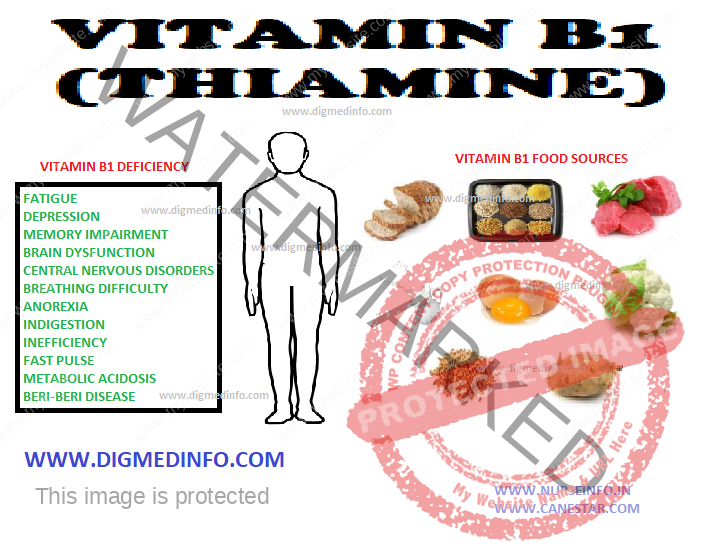WATER SOLUBLE VITAMINS – THIAMINE
THIAMINE (VITAMIN B1 – ANEURINE)
Thiamine plays an essential part in the metabolism of carbohydrates by acting as a coenzyme required for the decarboxylation of pyruvate to acetyl coenzyme A. It also takes part in other steps of the Kreb’s tricarboxylic acid cycle. Cereals contain the vitamin, which is maximal subjacent to the bran. Thiamine content of rice is lost during milling and polishing. Parboiling allows the vitamin to penetrate the grain and conserves it to some extent. Other good sources of the vitamin are sprouting pulses, green leafy vegetables, liver, pork, and legumes. Part of the vitamin is lost by washing or discarding the water used for cooking. The daily requirement is 0.4 mg/1000 kcal, i.e. 1.2 mg/day. Requirement is partially influenced by the intake of carbohydrates.
Deficiency States
Pathology of deficiency
In thiamine deficiency the cells cannot utilize glucose aerobically. Nervous system is affected first. Pyruvic and lactic acids accumulate and this leads to vasodilation. The myocardium shows loss of striation, vacuolation of fibers, fragmentation and edema. Cardiomyopathy, encephalopathy and peripheral neuropathy may develop. Sensory, motor and autonomic nerves show demyelination and degeneration.
Clinical features
Cardiovascular involvement results in ‘wet beriberi’ and nervous system involvement results in ‘dry beriberi’. Cardiovascular system Peripheral vasodilation leads to high output circulatory state, myocardial failure and retention of sodium and water leading to edema. The pulse is of high volume. The extremities are warm owing to vasodilation and tender owing to neuropathy. Acute fulminant cardiac failure may be rapidly fatal. Wet beriberi may occur in breastfed infants aged 2-8 months. The child presents with edema, oliguria and an aphonic cry. If not clinically suspected, this condition may be missed. Sudden death may occur.
Neurological involvement
This manifests as symmetrical sensori-motor polyneuropathy with muscle wasting. Foot-drop and wrist-drop are common. Deep hyperaesthesia occurs and it manifests as calf tenderness.
Wernicke’s encephalopathy
This is an acute neurological manifestation which is more common in alcoholics. Pathological changes occur in the upper part of the midbrain, hypothalamus and the walls of the third ventricle which show congestion and petechial hemorrhages, most marked in the mammillary bodies. The onset is sudden with vomiting, confusion, bilateral ophthalmoplegia, loss of consciousness, nystagmus, ataxia and psychological disturbances. Confusion proceeds to coma and death. Korsakoff’s syndrome is characterized by retrograde amnesia, impaired ability to learn and confabulation. Wernicke’s encephalopathy is associated with high mortality. Prompt administration of thiamine rapidly restores normalcy.
Diagnosis of thiamine deficiency
The condition has to be suspected clinically. It can be confirmed by demonstrating raised levels of blood pyruvate. Normal blood pyruvate is 62.5 to 125 mmol/liter and it may rise to 375 mmol/liter (3.3 mg/L). Measurement of erythrocyte transketolase activity, before and after the addition of thiamine pyrophosphate gives the most reliable diagnostic test.
Treatment:
When beriberi is suspected or diagnosed, 50 mg thiamine should be given intramuscularly daily for several days. After controlling the acute symptoms 2.5-5 mg should be given orally as maintenance. Wet beriberi and Wernicke’s encephalopathy have to be treated as medical emergencies. A dose of 25-100 mg of thiamine should be given intravenously to save life. Dramatic recovery with diuresis occurring within hours of injection confirms the diagnosis.
Infants with beriberi should be given 10 mg thiamine intramuscularly followed by oral doses. The mother also should be treated with oral doses of 10 mg twice daily for several days. Since polyneuropathy and Korsakoff’s psychosis are more resistant to treatment, the vitamin has to be given for prolonged periods. Once neuropathy is established, residual paralysis persists even after therapy. Adverse side effects to thiamine include sensitization and anaphylactic shock.


